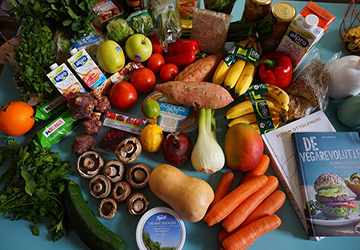One of the best parts about travel is the culinary scene. We get to experience different cultures. As insignificant as those may seem, few tourists are aware of the impact of their dietary choices on the ecosystem of the destination.
So, what does 'sustainable eating' entail? It is an effort to help local farmers and communities and lessen the carbon impact of food production and transportation. Clean and sustainable eating while traveling is difficult but not impossible.

Let's dive deeper into this guide to sustainable eating. Here are some pointers on how to eat clean and sustainable while traveling:
1. Choose Locally Grown Produce
Consider selecting fruits and vegetables that are sourced locally as much as you can. You can significantly reduce the carbon footprint associated with their production and transport, as they don't have to travel long distances to reach your plate. Moreover, buying locally-grown produce can contribute to the local economy and ensure that you receive fresher, more nutrient-rich options.
2. Look for Restaurants that Prioritize Sustainability
Look for restaurants that prioritize environmentally-friendly practices. For instance, eateries that choose organic ingredients focus on minimizing food waste and source their supplies from local farms. Additionally, many restaurants now offer plant-based options due to their lower environmental impact when compared to animal products. Opting for these alternatives can further reduce your carbon footprint and contribute to a more sustainable food industry.
3. Avoid Single-use Plastic
To minimize the use of single-use plastic, it's essential to avoid items like plastic straws and opt for reusable alternatives whenever possible. Rather than buying bottled water, consider bringing your own refillable water bottle that can be reused throughout your travels. Bringing a reusable food container can come in handy in case you have leftovers or need to take food to-go, helping to reduce waste and promote sustainability.
4. Try Vegetarian or Vegan Options
Reducing the consumption of animal products is a significant step toward decreasing greenhouse gas emissions. Transitioning to a predominantly plant-based diet is an easy and effective way to minimize your environmental impact. When dining out, look for vegetarian or vegan options on the menu, and don't hesitate to try new plant-based meals. These are great options for those who want to eat clean and sustainably while traveling.
5. Support Sustainable Food Markets and Farms
Consider shopping at farmer's markets and local food co-ops, as they typically offer vegetables and other food items grown in an environmentally responsible manner. This helps to reduce the environmental impact of food transportation while supporting local farmers. Additionally, you can find a variety of fresh and nutritious produce that is often unavailable in larger grocery stores.

Importance of Sustainable Eating While Traveling
Traveling and healthy, sustainable, and clean eating have now become crucial for the planet's health as well as ours. The production and transportation of food have a significant impact on the environment, contributing to greenhouse gas emissions, deforestation, and water pollution. Sustainable eating practices can help mitigate these negative effects and promote a more sustainable food system.
Here are some reasons why eating clean and sustainable while traveling is essential:
Reducing Carbon Footprint
Reducing the carbon footprint is one of the primary reasons for practicing sustainable eating while traveling. The transportation of food across long distances to reach the consumer generates significant greenhouse gas emissions. By choosing to eat locally sourced and plant-based foods, travelers can help reduce the distance food has to travel, thereby lowering its carbon footprint.
When we eat locally grown food, the energy required to transport the food is minimal, as it doesn't have to travel long distances. This reduces the overall carbon footprint associated with food production and transportation. Choosing plant-based meals over meat-based ones can also significantly reduce the carbon footprint of our diet, as animal agriculture is a significant source of greenhouse gas emissions.
Supporting Local Communities
Sustainable eating practices while traveling can have a positive impact on local communities. Eating locally sourced food provides travelers with an opportunity to experience the local cuisine and culture. It creates a sense of cultural exchange between tourists and the communities they visit, promoting mutual understanding and respect. Sustainable eating practices, therefore, not only benefit the environment but also contribute to sustainable and responsible tourism.
Conserving Resources
Sustainable eating practices promote the conservation of natural resources such as water, energy, and land. Choosing plant-based meals over meat-based ones can help conserve water resources, as animal agriculture is a significant user of water.
Furthermore, sustainable eating practices also conserve energy resources. The energy required for the production, transportation, and packaging of food is significant. By choosing locally sourced and minimally processed food, travelers can reduce the overall energy consumption associated with food production.
Minimizing Waste
Sustainable eating practices involve minimizing waste, which is crucial for promoting a circular economy. When we eat on the go while traveling, we often generate a lot of waste, including single-use plastic utensils and packaging.
One way to minimize waste is by using reusable containers and utensils. This helps reduce the amount of waste generated and promotes a more sustainable and responsible tourism industry. Another way to minimize waste is by choosing food options that don't generate much waste, such as buying whole fruits and vegetables instead of pre-cut ones.
Conclusion
We conclude this guide to sustainable eating by stating that it's important to consider the impact of our eating practices on the environment, local communities, and the tourism industry.
Traveling and eating healthy can go hand in hand. As travelers, we can play an essential role in promoting sustainable eating practices by making conscious food choices. We can have a positive impact on the environment, enjoy delicious, fresh meals that showcase the local culture, and promote sustainable tourism. So, the next time you travel, consider how your food choices can contribute to a more sustainable future.


